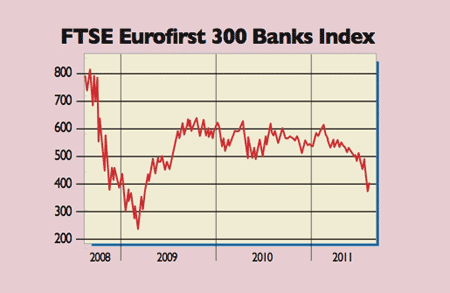
“There’s a remorseless… circularity about it all,” says Jeremy Warner on Telegraph.co.uk. “By causing a deep recession and spiralling public debts, the original banking crisis transmogrified into a sovereign debt crisis, which, because sovereign bonds are a core asset for all large banks, now threatens to transmogrify back into a second banking crisis and another deep recession.” And this time governments can’t afford massive bailouts.
There have recently been “some alarming moves in [eurozone] indicators that flashed red during the credit crunch”, says Nikhil Kuma in The Independent. The gap between overnight rates set by central banks and interbank rates has widened, showing that banks are increasingly reluctant to lend to each other. The gap between the three-month Euribor rate and the overnight rate, for instance, has more than tripled to its highest level since the spring of 2009. However, it remains a long way off 2008 panic levels.
Credit default swaps measuring the cost of insurance for five-year bank debt have jumped for Italian and French banks. More and more banks are relying on European Central Bank (ECB) funding. According to Morgan Stanley’s Huw van Steenis, Italian banks’ usage of ECB facilities is at a four-year high. He also notes that eurozone banks have struggled to raise long-term funds of late. European banking stocks, as measured by the FTSE Eurofirst Banks index, have lost 25% since early July.
Banking jitters have intensified of late because the EU’s recent decision to restructure Greek debt has raised the prospect of bank losses on other countries’ bonds, says Walter Molano of BCP Securities. A 50% write-off of the value of Italian and Spanish bonds “would wipe out the European banking sector”. French banks’ exposure to peripheral debt, along with their reliance on short-term funding and the focus on France’s public finances, has dragged Société Générale and other French banks into the maelstrom. With the mood increasingly febrile of late, the markets have been “reacting to any little rumour”, says David Thebault of Global Equities.
As it becomes harder for banks to fund themselves in the markets, lending to households and businesses will be undermined, says Creditsights. That “could derail an already weak recovery in Italy and France”. So unless policymakers can stop this crisis of confidence from spreading with a “comprehensive, co-ordinated and credible plan”, as UBS’s Philip Finch puts it, another European credit crunch could be looming.